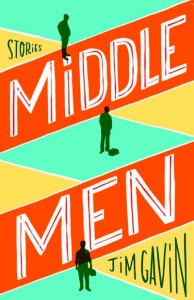Blog
Middle Men by Jim Gavin
 To say the hard luck characters in Jim Gavin’s “Middle Men” stories wander obliviously through their days sells them a bit short. They may cling to hopes and dreams as momentary releases from the circumstances of their lives, but they are not ignorant of these circumstances.
To say the hard luck characters in Jim Gavin’s “Middle Men” stories wander obliviously through their days sells them a bit short. They may cling to hopes and dreams as momentary releases from the circumstances of their lives, but they are not ignorant of these circumstances.
Published this spring by Simon & Schuster, Gavin’s first book traverses the city of Los Angeles to detail people encountering unwelcome moments of truth.
The hotshot teenage basketball player in “Play the Man” lies about receiving scholarship offers from Division I colleges to impress his teammates after he transfers to a new high school. In his mind, he sees the player he wants to be running circles around the player he is. This realization fuels the dread he feels as he prepares to play against the squad he was cut from at his old school.
A young lover knows the messages from his older girlfriend in Bermuda spell the end for their relationship. He scrapes together just enough money for a plane ticket to visit her, anyway, unable to swallow the idea he did not try one last time.
An aspiring comedian loudly berates his fellow performers at a talent night because deep down he can see that he’s one of them, lacking the right connections, moving laterally from show show, treading water in the same talent pool.
A brother’s shortcomings influence his sister to reassess the wisdom of her career choices in Northern California. For a free steak dinner, a failing screenwriter tolerates his condescending uncle.
These are people making sometimes absurd bargains with themselves, not so much out of delusion, but because they don’t have the right cards to play. Gavin knows his characters so well that every snippet of dialogue reveals the humor and bathos in this bargaining.
Gavin drives readers to the less glamorous corners of L.A., the plumbing junkyards and ungroomed municipal golf courses, the inland sprawl and desert towns, fast-food exits and back roads leading into the grayish haze of abandoned stretches of beach. In one story, he gives us glimpses of Hollywood’s fast lane from the golf cart of a game show lot.
Gavin’s middle men try their best to convince themselves they’re moving upward, or, at the very least, that the middle will hold for them, if no one else. Therein lies the humor and tragic overshadowing of their separate stories. But perhaps the lies we choose to tell ourselves are the best measures of our character.
In the book’s final story an aging widower has learned to resist the drug of dreams, allowing himself only the slight possibility of winning the toilet/plumbing parts salesman of the year award. By never reaching far he’s ensured he no longer gets hurt when he falls. He loses himself in the simple pleasures of watching the Dodgers on TV, eating junk food and making a rare family outing to Catalina. His recipe for disillusionment is simple: to live without hope.



